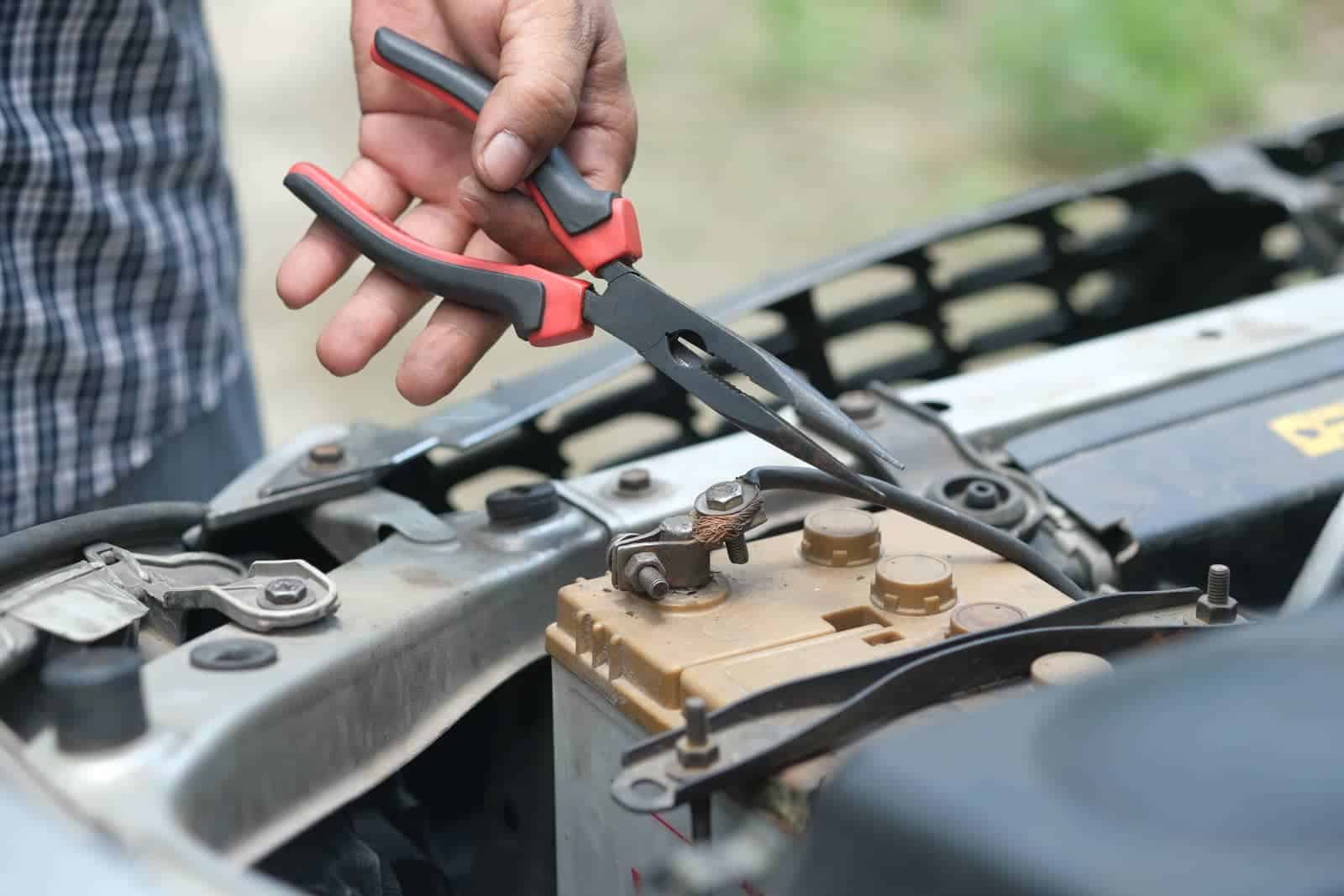As an automotive technician, you know that your profession is unique and demands specific requirements from the devices you use daily. Your search for the best laptop for automotive technicians requires careful consideration and a deep understanding of the features and performance that directly impact your work. As someone familiar with the automotive industry, I've spent countless hours reviewing an extensive spreadsheet of recent laptop releases, comparing specs, and analyzing both professional and user-generated reviews. My goal is to help you find the perfect laptop tailored to your profession's unique requirements and budget.
Automotive technicians need a laptop that can handle the software and hardware requirements of diagnostic tools, ECU programming, and repair manuals. Additionally, a laptop with a rugged build and long battery life is essential for dealing with the wear and tear of a workshop environment. In this guide, we'll focus on the specifications that matter most to automotive technicians, such as durability, processing power, and compatibility with industry-specific equipment.
Throughout the selection process, I've prioritized key factors, including the laptop's performance with popular automotive diagnostic software like Snap-On's ShopKey Pro, Mitchell1's ProDemand, and Alldata. Furthermore, I've kept in mind the need for a laptop that can handle the demands of various OBD-II scan tools, ECU tuning software, and other essential tools of the trade. So, whether you're working in a dealership or running your own repair shop, this guide will help you find the best laptop for automotive technicians to maximize your efficiency and productivity.
Rev up your performance with these processors
As an automotive technician, you need a reliable laptop with a powerful processor to run diagnostic software and handle other tasks. In this section, we'll discuss how to decide on the right processor for your needs.
What's new in the laptop processor market?
The laptop processor market is always evolving, with new models being released frequently. Apple's ARM-based M1, M2, M2 Pro, and M2 Max system-on-chip modules offer excellent single-core performance and battery life. AMD has captured 20% of the laptop CPU market and recently began shipping the first batches of laptops equipped with its latest 7th-generation Ryzen processors. While Intel's 13th-generation Core processors have already been released, 12th-generation Core CPUs can provide a lot of value, especially if you don't need cutting-edge performance.
Is a dedicated graphics card needed for car diagnostics?
A dedicated graphics card isn't necessary for car diagnostics unless you're working with 3D models or advanced visualization tools. If you're not using an external display, a mid-range CPU with more power-efficient graphics should suffice.
How do you know what's fast and what's not?
The processor is one of the most critical components in a laptop since it's directly linked to the performance of the entire machine. I use Cinebench R23 and PassMark scores to compare processors. These scores are not perfect, but they're pretty good for comparing different processors within their price range.
What are your budget constraints?
Budget is always a concern, and it's essential to consider the processor's price-to-performance ratio. If you're on a tight budget, an i3-1115G4 should suffice, but if you want better performance, consider an i5-1135G7. For high-end performance, an i7-11370H is an excellent option.
Table of recommended processors (CPU) and their benchmarks (GPU)
| Processor | Cinebench R23 score | PassMark score |
|---|---|---|
| Intel Core i3-1115G4 | 1244 | 6690 |
| Intel Core i5-1135G7 | 2294 | 10495 |
| Intel Core i7-11370H | 2973 | 13500 |
In conclusion, when deciding on the right laptop processor for automotive technicians, consider the processor's speed, power consumption, and price-to-performance ratio. With our recommendations and benchmark scores, you can choose the best processor for your needs and budget.
Rev Up Your Laptop's Graphics for Automotive Design
The graphics card market for laptops has evolved, with Nvidia continuing to dominate the space. While RTX 40 series cards are starting to emerge, the current market is still dominated by RTX 30 series cards. Additionally, desktop GPUs are now more power-hungry than ever, widening the gap between notebook graphics and desktop graphics cards.
For automotive technicians who use CAD/CAM software, a dedicated graphics card is not essential. However, it can be helpful for VRAM allocation and for keeping the laptop cool. When it comes to graphics performance, 3DMark is a reliable benchmarking tool for comparing laptops.
Choosing between Nvidia and AMD depends on whether you want better battery life or better performance. For better performance, Nvidia GPUs are a better option, while AMD is suitable for those who prioritize battery life.
If you're looking for a gaming laptop, other components like the processor and RAM amount are more critical than the GPU.
Here are some recommended GPUs for automotive technicians based on their expected price range:
| GPU | Expected Price Range |
|---|---|
| GeForce GTX 1650 | $800 – $1200 |
| GeForce RTX 3050 | $1200 – $2000 |
| GeForce RTX 2060 | $2000 – $3000 |
Ultimately, the choice of GPU will depend on your budget and your specific needs as an automotive technician. However, the above-listed GPUs provide an excellent starting point for making a wise investment in a laptop that can efficiently run CAD/CAM software.
Frequently asked questions for gearheads
Q: What is the best laptop for automotive technicians?
The best laptop for automotive technicians depends on your specific needs and budget. However, the Lenovo Legion 5 Pro is a great choice for those who prioritize performance and value.
Which laptop is good for OBD2 diagnostic software?
For OBD2 diagnostic software, we recommend at least an i5 processor and a dedicated graphics card, such as the GeForce GTX 1650. The ASUS ROG Strix Scar and HP Victus 15t are both great options at different price points.
Can you use a MacBook for automotive diagnostics?
Yes, you can use a MacBook for automotive diagnostics. However, since most automotive software is designed for Windows, you will need to use virtualization software or dual boot with Windows to run the software.
What are the minimum laptop requirements for automotive software?
The minimum laptop requirements for automotive software are an i3-1115G4 processor, 8 GB of RAM, and a GeForce GTX 1650 graphics card. However, we recommend going for a higher-end option for better performance.
How much RAM do I need for automotive diagnostic software?
For automotive diagnostic software, we recommend at least 16 GB of RAM to ensure smooth performance. Some high-end software may even require 32 GB of RAM.
Is a dedicated graphics card necessary for automotive diagnostic software?
A dedicated graphics card is not always necessary for automotive diagnostic software, but it can significantly improve performance, especially with graphically-intensive applications. We recommend at least a GeForce GTX 1650 graphics card for a smooth experience.
What is the best brand of laptop for automotive technicians?
The best brand of laptop for automotive technicians depends on your budget and personal preference. However, brands such as Lenovo, HP, and ASUS are known for producing reliable and high-performing laptops for professionals.
Can a laptop replace a scan tool for automotive diagnostics?
While a laptop can be used for automotive diagnostics, it cannot replace a scan tool entirely. A scan tool is designed to access specific diagnostic information from your vehicle's onboard computer system, while a laptop can run software for more advanced analysis.
What are the recommended screen size and resolution for automotive software?
For automotive software, we recommend a minimum screen size of 15 inches and a resolution of 1920×1080. This will provide enough screen real estate to work with multiple windows and ensure clarity.
Are there any laptops designed specifically for automotive technicians?
While there are no laptops designed specifically for automotive technicians, some brands offer rugged laptops that can withstand harsh environments and accidental drops. The Panasonic Toughbook line is a popular choice in this category.
Rev Up Your Laptop's Performance with Ample RAM
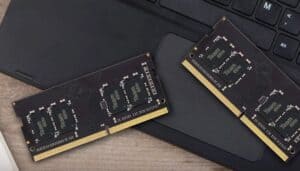
As a modern automotive technician, having the right laptop with sufficient RAM is crucial for efficiently diagnosing and fixing vehicle issues. However, when it comes to choosing the right laptop RAM, there are a few things to consider.
Memory Market
First, it's essential to understand the recent changes in the memory market. Most laptops come with 16 GB of RAM, and high-end models come with 32 GB or more. While DDR5 is the latest standard, it's still expensive and not yet widely available, so DDR4 remains the most common option.
RAM Amount Needed
RAM is not as important as storage or a processor, but it's still critical. For most automotive applications, 16 GB is sufficient. However, if you work with resource-intensive software such as 3D rendering or video editing, 32 GB is the sweet spot. And if you're a professional who needs the most powerful laptop possible, 64 GB would be ideal.
DDR5 or DDR4
If you're looking for a laptop that will last for several years, it's worth considering DDR5 memory, which is the latest standard. However, DDR5 is still expensive and not yet necessary for most automotive technicians. So, if you're on a budget, DDR4 will do just fine.
Quality of Memory Module
When choosing a laptop, it's not just about the amount of RAM; it's also essential to consider the quality of the memory module. You should check how many slots are available in your desired laptop model, so you can upgrade it later if needed without buying a new machine.
Recommended RAM Configurations
Here are our recommended RAM configurations for automotive technicians, organized by price range:
| Minimum Budget | 8 GB |
|---|---|
| Mid-Range Budget | 16 GB |
| High-End Budget | 32 GB |
Ultimately, the right RAM for your laptop depends on your needs and budget. By considering the amount of RAM required for your specific applications and checking for the quality of the memory module, you can make an informed decision that will help you work more efficiently and effectively as an automotive technician.
4 Best Laptops for automotive technicians
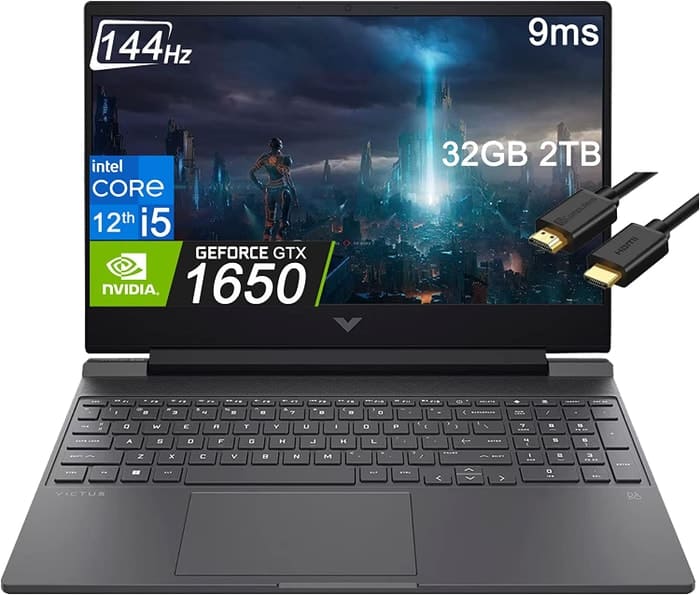
1.HP Victus 15
HP Victus 15: Affordable Gaming Laptop with Solid Performance and Limited Battery Life- Excellent price
- Good gaming performance
- Can double as a work laptop
- Solid array of ports
- Bad battery life
- Rather plain design
- Weak GPU yields unsatisfactory frame rates
- Screen only so-so despite 144Hz refresh rate
Summary
The HP Victus 15 offers a great value for its price, delivering respectable gaming performance and handling routine tasks with ease. It may not have the most visually appealing design, and its battery life is subpar, but it is a solid option for budget-conscious gamers.
Alternatives
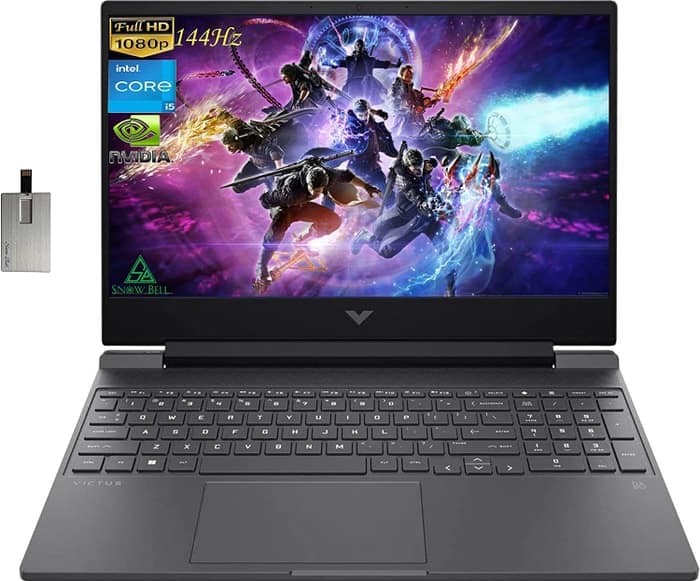
HP Victus
- Delivers smooth gameplay at 1080p.
- Fast SSD.
- No VRR to reduce screen tearing.
- Slow response time on display.

2.ASUS TUF Dash F15
ASUS TUF Dash F15: A budget-friendly, powerful laptop with a few quirks.- Lightweight and well built
- Good input and IO options
- More powerful than the previous generation
- Competitively priced
- Some quirks affecting everyday ergonomics
- Ports squeezed together on the left edge
- Be cautious of the FHD 144Hz panel option
Summary
The ASUS TUF Dash F15 is a well-built and lightweight laptop, offering good input and IO options. With a significant improvement in performance compared to its predecessor, it is competitively priced and a great option for those on a lower budget. However, be cautious of the FHD 144Hz screen option and opt for the FHD 300Hz display if available.
Reviews
Alternatives

Lenovo Legion 5i Pro 16
- Stylish, sleek form factor
- Gorgeous display
- Webcam quality is poor
- No biometrics
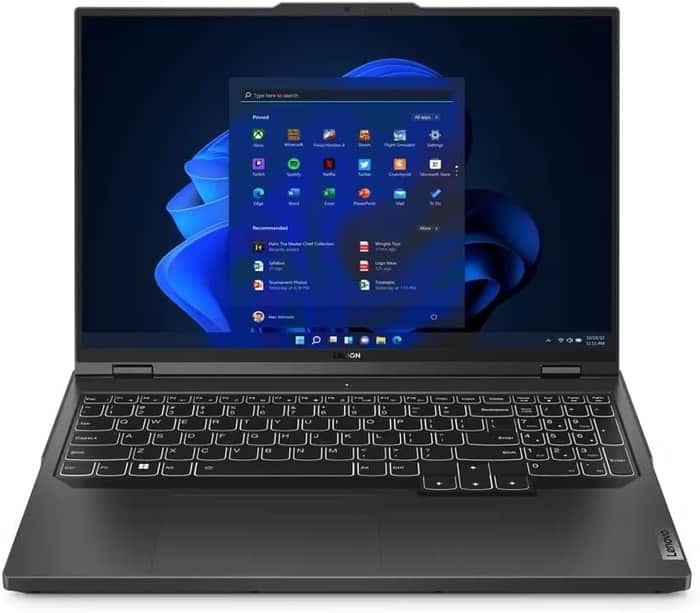
3.Lenovo Legion Pro 5
Lenovo Legion Pro 5i: A solid mid-tier laptop with good performance, but with some notable drawbacks.- Good build quality and design
- Good screen and IO
- Competent CPU with multiple GPU options
- Competitively priced
- No Thunderbolt or biometrics
- Some hotspots while gaming
- Poor speaker quality
- So-so battery life
Summary
The Lenovo Legion Pro 5i offers good value for the price with its solid build quality, good screen, and plenty of performance. However, potential buyers should be aware of the laptop's hotspots under sustained loads, limited battery life, and lacking speaker quality.
Reviews
Alternatives
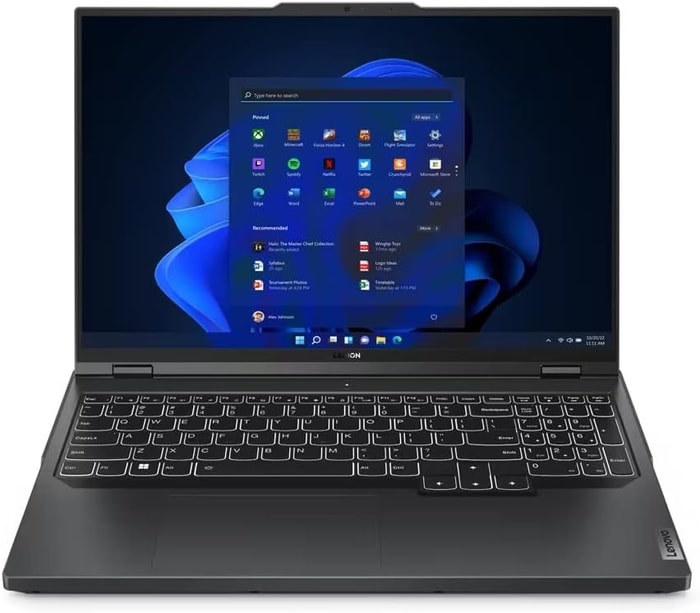 $2,840
$2,840Lenovo Legion Pro 5
- Strong performance for the price
- Quality build and port selection
- Display quality and battery life are just decent
- Bulky and heavy

4.Lenovo Legion Pro 7i 16
The Lenovo Legion Pro 7i 16 offers impressive performance and a sleek design at a justifiable price point, making it a solid choice for gaming laptop enthusiasts.- Strong overall performance
- Big, bright, and fast display
- Per-key RGB lighting
- Some flex to keyboard deck
- Poor battery life
Summary
The Legion Pro 7i 16 is a high-end gaming laptop that delivers strong overall performance and a big, bright, and fast display. While it may have some limitations with its GPU and poor battery life, it offers great value and a sleek design.
Alternatives

HP Omen 17
- QHD display with a high refresh rate
- Expandable working memory
- Slightly below-average performance for a RTX 4080
- High noise level
Table of the Best Laptops for automotive technicians
| Laptop | Price (approx) |
| HP Victus 15 | $880 |
| ASUS TUF Dash F15 | $1,160 |
| Lenovo Legion Pro 5 | $2,630 |
| Lenovo Legion Pro 7i 16 | $3,390 |

